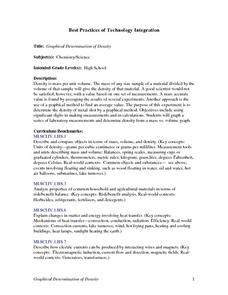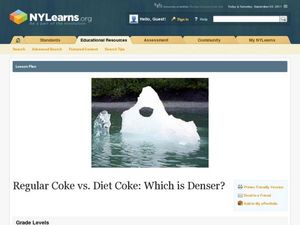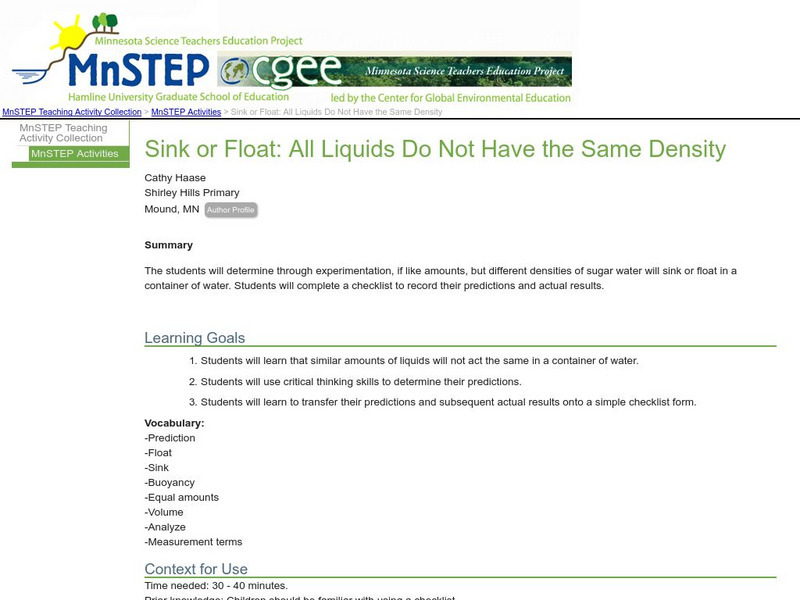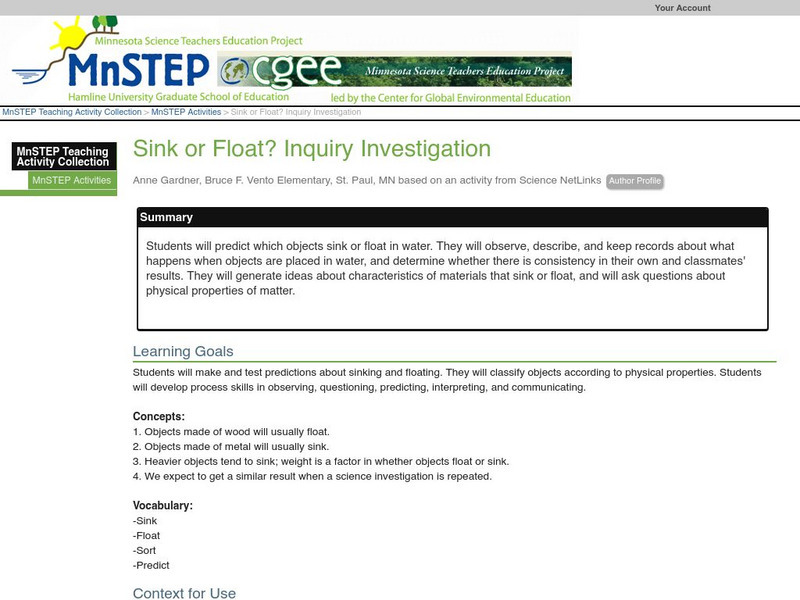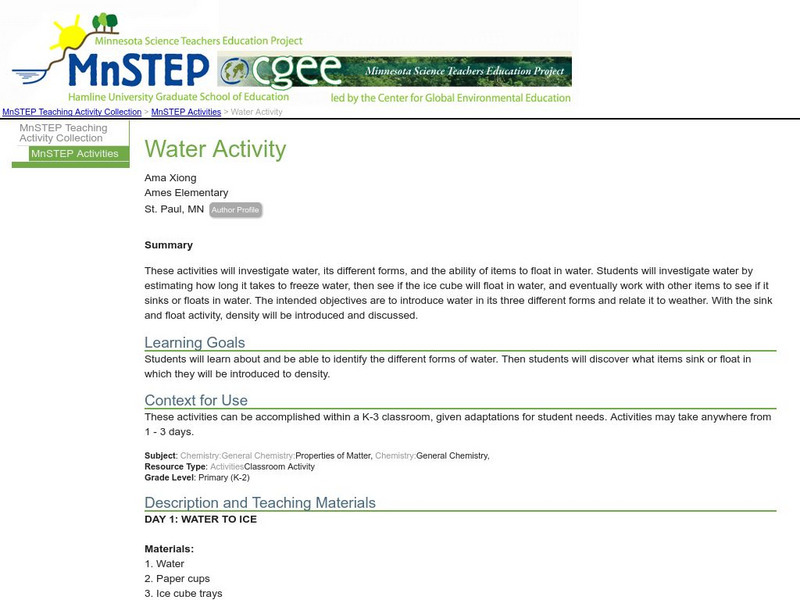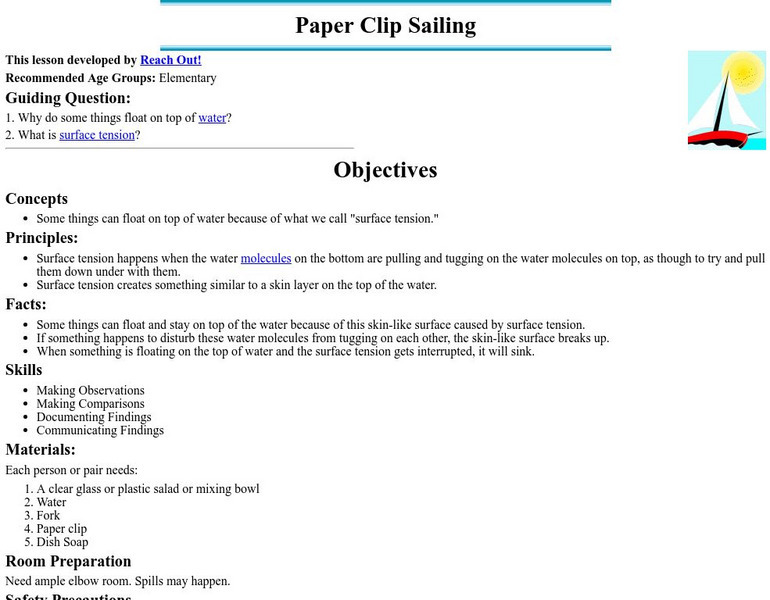Curated OER
Regular Coke vs. Diet Coke: Which is Denser?
Learners define the terms "mass," "volume," and "density." The relationship between these three terms is established. They observe the differences between Regular and Diet Coke. They develop an hypotheses about why a can of Regular Coke...
Curated OER
Sink or Float Experiment
Students participate in an experiment to determine which objects float or sink. They use different amounts of salt for the objects and discover as the salt content increases, objects will float. They record their predictions and what...
Curated OER
MEASURING THE DENSITY OF WATER
Students perform an experiment to measure the density of tap water vs. salt water.
Curated OER
Density - An Introduction
Students experiment with objects of different densities. In this density instructional activity, students examine same-sized objects with different weights, then look at a teacher explanation of density. Students make wave bottles and...
Curated OER
Graphical Determination of Density
Students determine the density of metal shot by a graphical method using significant digits in making measurements and calculations. Students graph a seris of laboratory measurements and determine density from a mass verses volume graph.
Curated OER
Regular Coke versus Diet Coke, Which is Denser?
Students investigate the density of liquids. For this geometry lesson, students calculate the volume and differentiate between volume, mass and density. They observe similarity and differences between coke and diet coke.
Curated OER
8th Grade Earth Science: Density
Students draw upon their prior knowledge of the density of water and practice writing a hypothesis, making an observation, and analyzing data while watching a density demonstration.
Better Lesson
Better Lesson: Floating and Sinking Sorting in Science
Students sort objects according to whether they sink or float.
Utah Education Network
Uen: Does Coke Float?
Sixth graders predict if different types of coke will float or sink.
Science Education Resource Center at Carleton College
Serc: Mn Step: Sink or Float: All Liquids Do Not Have the Same Density
An experiment in density. After a review of floating and sinking of different materials, students test four bottles, all holding four ounces of water, to see if they will float or sink. They each contain a different density of sugar...
Science Education Resource Center at Carleton College
Serc: Investigating Density in Solutions: How Can You Make an Egg Float?
In this activity, young scholars will learn about density by determining how to make an egg float in water. By the end of the lesson, students will understand that density and weight are different and that density matters in floatation....
American Chemical Society
Middle School Chemistry: Density: Sink and Float for Liquids
Young scholars determine whether a liquid will sink or float in water by comparing its density to the density of water.
Science and Mathematics Initiative for Learning Enhancement (SMILE)
Smile: Density in Relation to Float and Sink
Students find the densities of objects based on sinking or floating in this activity that demonstrates Archimedes Principle.
Science Education Resource Center at Carleton College
Serc: Density of Solid Objects
In this science inquiry, students investigate whether volume or density of objects determine the floating or sinking in water. Using a rock and a block of wood teachers engage students in the discussion of density, mass and volume.
Science Education Resource Center at Carleton College
Serc: Mn Step: Sink or Float? Inquiry Investigation
For this activity, students make predictions about whether different objects float or sink, then test them. They are asked to record their observations and results for each, and compare their results to others'.
HotChalk
Hot Chalk: Lesson Plans Page: Sink or Float?
This lesson plan is designed to have young children explore the concept of sinking vs. floating by using the skills of prediction, observation and classification.
PBS
Pbs Learning Media: Sesame Street: Sink or Float Educator Guide
This is an educator's guide for a unit on things that sink or float. It includes lesson plans, experiments, and activities. Students apply the scientific method as they investigate whether objects sink or float.
Science Education Resource Center at Carleton College
Serc: Water Activity
Students investigate water by estimating how long it takes to freeze, then see if the ice cube will float in water, and eventually work with other items to see if they sink or float in water.
Michigan Reach Out
University of Michigan: Paper Clip Sailing
Basic experiment that helps students learn about surface tension.
PBS
Pbs Teachers: Scientific American: Beneath the Sea: Blowing Ballast
Explore the use of ballast to manipulate buoyancy in submarines by building a model of a submersible using two-liter bottles and balloons. Describe the balance of forces that is responsible for the surfacing and diving of submersibles.




